Vexed to nightmare: The state of transgender rights in Wyoming
Bathroom bills. Sports bans. The outlawing of consensus medicine. The end of counselor confidentiality. From Cody to Cheyenne, trans and nonbinary residents respond to a “grim” new landscape.
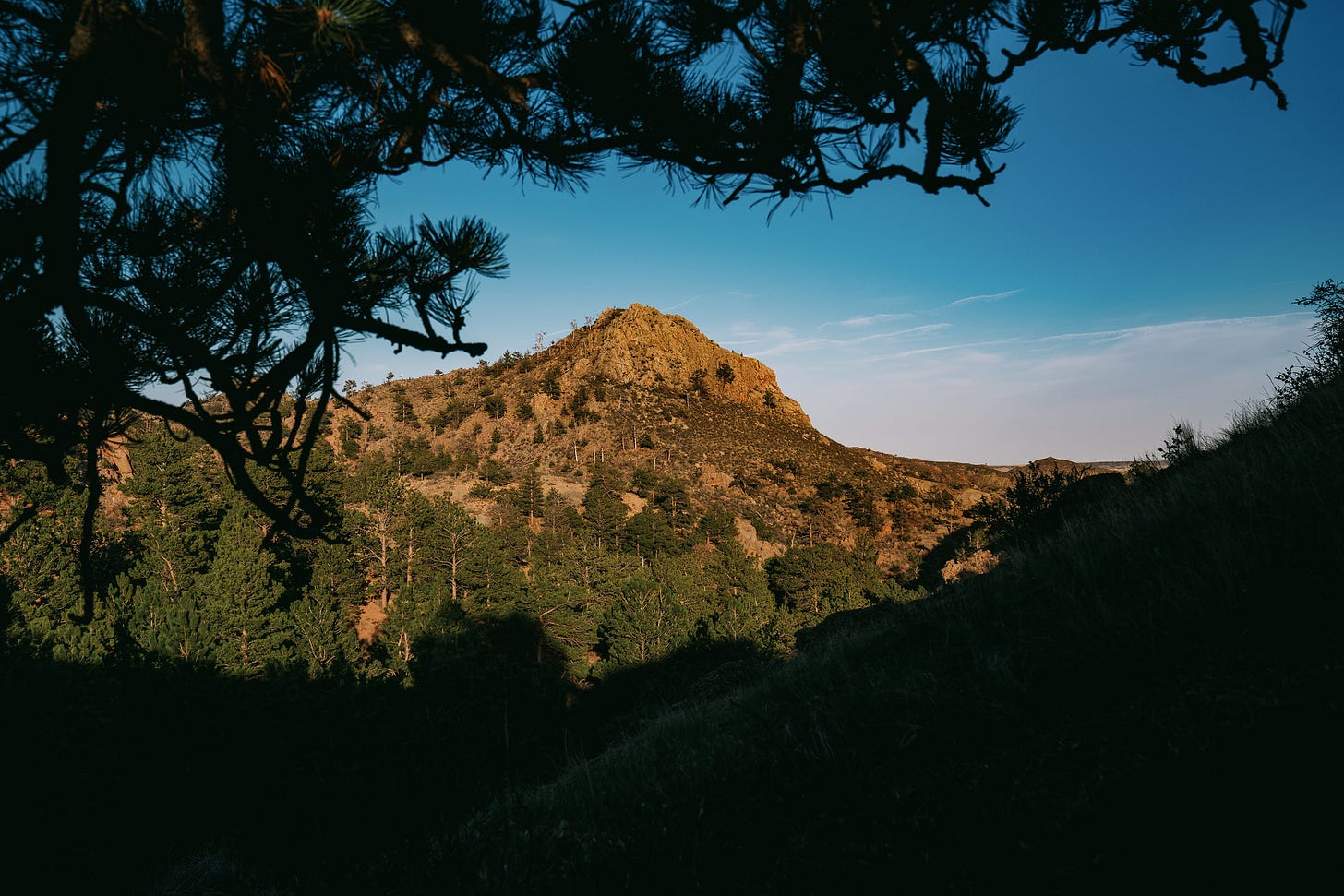
A new era is at hand for transgender Wyoming.
The State Legislature approved five bills this year restricting the privacy, inclusion or legal recognition of transgender residents in sports, bathrooms and other areas of public life.
Gov. Mark Gordon refused to stop any of these bills, signing three and letting the other two slip into law without his signature.
This year’s legislation adds to a growing stack of state laws targeting the healthcare and safety of transgender residents, especially transgender youth, an embattled minority who already live under discriminatory federal decrees and face disproportionately high rates of homelessness, depression and suicide.
“What this legislation — all of it, both federal and state — is doing is causing chaos,” said Elliott Hinkle, a transgender resident of Casper who testified against multiple bills during the 2025 General Session. “It’s going to lead to young people taking their lives and having worse mental health outcomes, because there’s very little in the world telling them that they should exist.”
Transgender residents hailing from across the state tell the Laramie Reporter these new policies have radically altered the landscape of LGBTQ+ rights in Wyoming.
Santi Murillo is the communications coordinator for Wyoming Equality, the state’s preeminent LGBTQ+ rights organization. She has consistently argued the anti-trans sentiment behind the new legislation is not reflective of the Wyoming she knows and loves.
“I think it’s just a blip,” the lifelong Wyomingite said. “Given the political climate — not just in the state of Wyoming, but on a national level — I think things are going to be pretty grim for a few years. However, I think there will be a shift. I think people will realize how cruel they’re being to such a small population of people.”
Murillo is one of several transgender residents who say they will stay to fight any further erosion of their rights. Others plan to leave.
Artemis Langford, a transgender University of Wyoming student, told the Reporter in February she plans to move somewhere that “values my contributions to society and my life” once she graduates in May.
“I don’t want to go,” she said. “But if my state government doesn’t believe that I’m worth investing in or even considered as a human with the rights and privileges of being a citizen, how am I supposed to live here and be free?”
Those who remain must face, in the immortal words of W. B. Yeats, a “widening gyre” — the dawn of a new era that will remake everyday life in Wyoming.
Transgender Wyomingites, whether leaving or staying, say they will always exist. As a new legislative regime is loosed upon the world, they are leaning into politics, conversation, and community to light the way as darkness drops again.
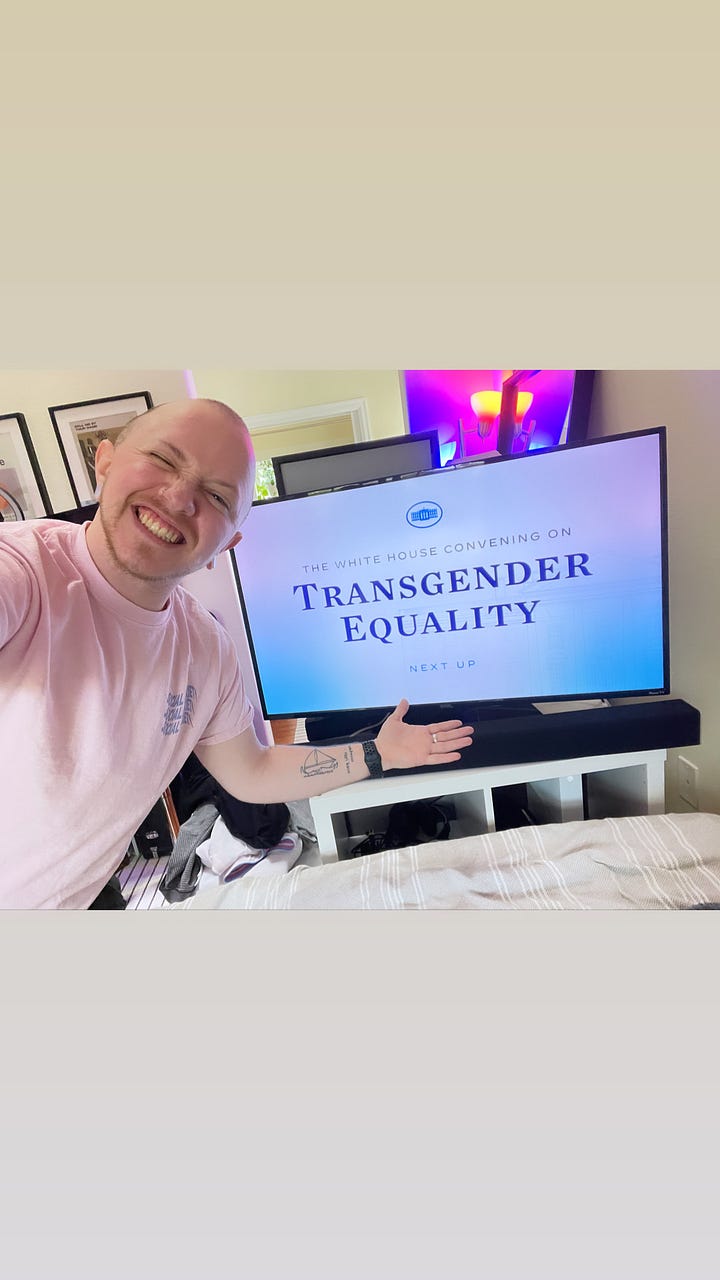
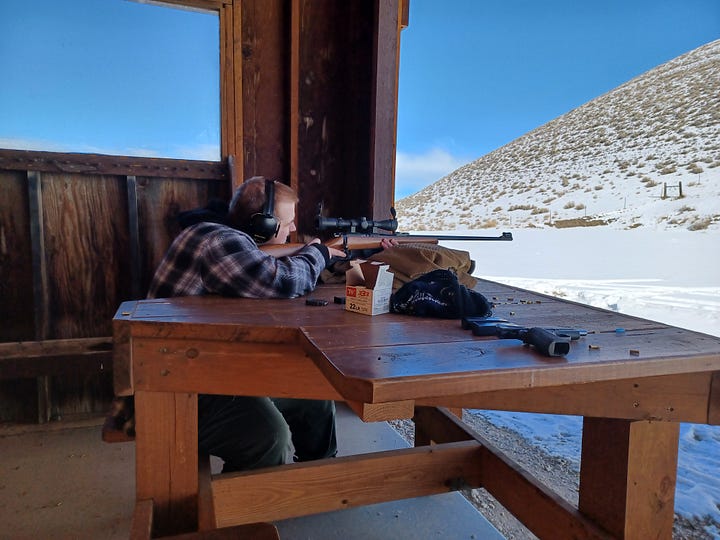


1: Ceremony of innocence
Imagine, if you will, growing up a girl.
You feel safest and most at home with the other girls in your class. You like to wear dresses because you see them on your mother, your teachers, and the other women you look up to. When you play Star Wars with your brothers, you always pick Rey.
But then something starts to change. For reasons you can’t quite understand, the adults in your life start grouping you in with the boys. They stop letting you wear dresses. They tell you to pick a boy Jedi.
If you’re coming up in Wyoming, this is only the beginning of your disorientation.
Before you can understand what’s happening, you begin to fear that telling your parents how you feel won’t go well. So instead, you go to another trusted adult at school — your teacher, the nurse, a counselor — and you try to explain that you want to play with the girls, that there’s been some mistake because everyone keeps calling you a boy.
Unfortunately for you, that “trusted” adult can’t be trusted at all. They’re not a confidante. They’re an informant, and a law passed in 2024 mandates they tell your parents.
If things go poorly, you might be scrunched up and forced back into the closet for a few more years. If things go disastrously, you might be kicked out, homeless, asking your friend if you can sleep on their couch.
But let’s say it goes well. Your parents don’t understand, but you reach a truce, a tepid acceptance that you’re not really the son they thought you were.
Just as their acceptance blooms — your mom buys you a dress, your dad uses your pronouns, together they shut down a cruel comment from your grandmother — you enter high school, learning words like “transgender,” “non-binary,” and “assigned male at birth.”
Then it happens.
Your friends are trying out for volleyball, but you are stopped at the door.
“I’m a girl,” you insist.
“We know what’s between your legs,” they say in not so many words. “You can go out for football if you want.”
But you’re not doing that. It’s degrading. You want to run away. You want, for the first time in your young life, to run far away from here.
As your friends join the volleyball team, you wander. Maybe you find your way to theatre or debate or some other activity where adults are less concerned about your body, less confrontational about its particulars.
Maybe, like thousands of young Wyoming outcasts before, you find your peace among the sagebrush or the aspens or the coniferous reaches just beyond your hometown. You discover it’s easier to breathe in the clear, crisp air of a chilly winter outing.
So you take up camping, snowshoeing, stargazing. You start talking a lot about public lands. And you find, out here in the wilds, you are just you. A human on the earth. A piece of the world reflecting on itself.
And for now, this is far enough to run.
Sports, the next generation, and missing out on growing up
Santi Murillo has monitored the erosion of LGBTQ+ rights in her home state for the last several years. Legislation targeting transgender folks has accelerated, she said, because lawmakers are following national talking points.
“I’m really disappointed that a lot of these legislators voted the way they did just to secure their next elections,” Murillo said. “But I also just feel sorry for the kids that this is going to affect.”
One of the new laws mandates school districts across the state designate restrooms and locker rooms as exclusively male or female, and to enforce the division. Another mandates the same at community colleges, the University of Wyoming and correctional facilities.
Senate File 77, meanwhile, prohibits government agencies from requiring employees use any other employee’s preferred pronouns. And House Bill 32 declares sex and gender one and the same, codifying that definitional inaccuracy as the official policy of the Equality State.
The final bill extends the state’s existing transgender sports ban to college athletics, forbidding UW from allowing transgender students to compete for the Cowgirls — and forbidding the Cowgirls from competing against any other team more inclusive than UW. Despite calling a 2023 high school sports ban “draconian,” Gov. Gordon signed the new ban into law last month.
Murillo testified against many of these bills. But the collegiate sports ban hits particularly close to home for the former UW cheerleader.

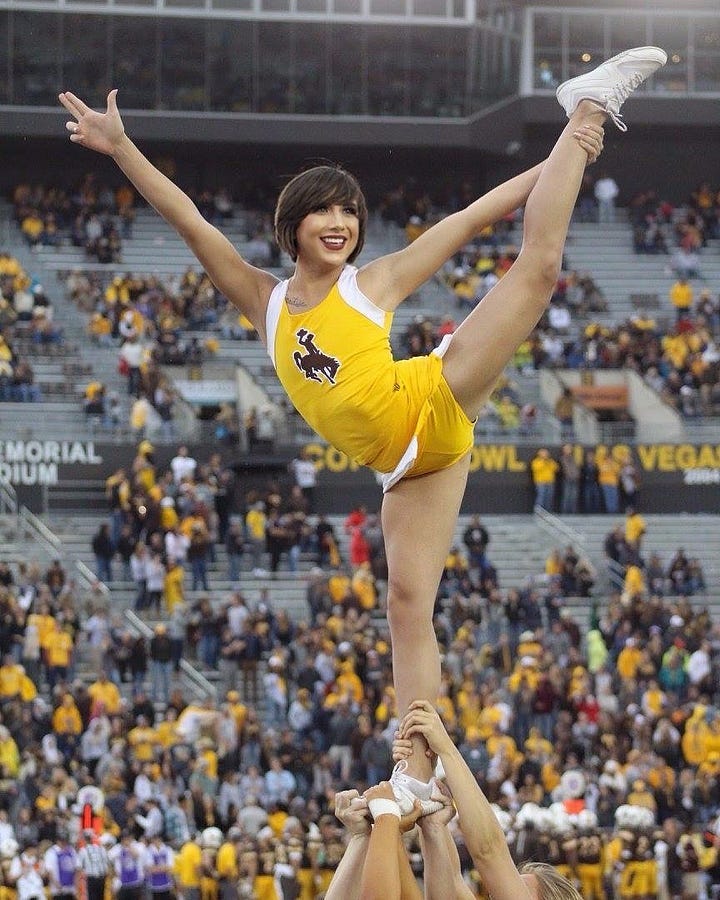
With the signing of Senate File 44, Murillo said the next generation of aspiring athletes will not have the same opportunities she did.
“I know firsthand what it’s like to be in their shoes, and to just want to feel included and feel like they’re a part of something,” Murillo said. “Now they’re not going to have their community, and they’re not going to have the support that they need.”
Today, Murillo coaches cheerleaders at Cheyenne East High School. She said transgender kids will be denied the camaraderie, care and personal growth young people find in sports.
“It means that they are missing out on a crucial part of growing up,” Murillo said. “They’re not going to be able to learn the life lessons that being part of a team teaches you. I teach my kids respect, responsibility, accountability, and they’re missing out on that all because of who they are.”
Years past: Attacking medical care and counselor confidentiality
The mountain of anti-trans legislation passed this year builds on the work of previous sessions. In 2023, legislators passed a more limited sports ban which applied only to high school sports. It was the first anti-LGBTQ+ bill in a generation, according to WyoFile.
During public testimony this session, Wyoming Equality’s executive director, Sara Burlingame, said the 2023 ban targeted an extremely small minority; in the end, it drove two students from high school sports teams.
In 2024, legislators passed a total ban on gender-affirming care for transgender youth, threatening to strip the medical license of any physician who prescribed hormone blockers or therapy — despite these interventions being considered the highest standard of care for transgender youth by every major medical, psychiatric and pediatric association in the United States.
The ban on gender-affirming care targets transgender individuals specifically; the legislation exempts the use of the very same procedures and medications for cisgender patients.
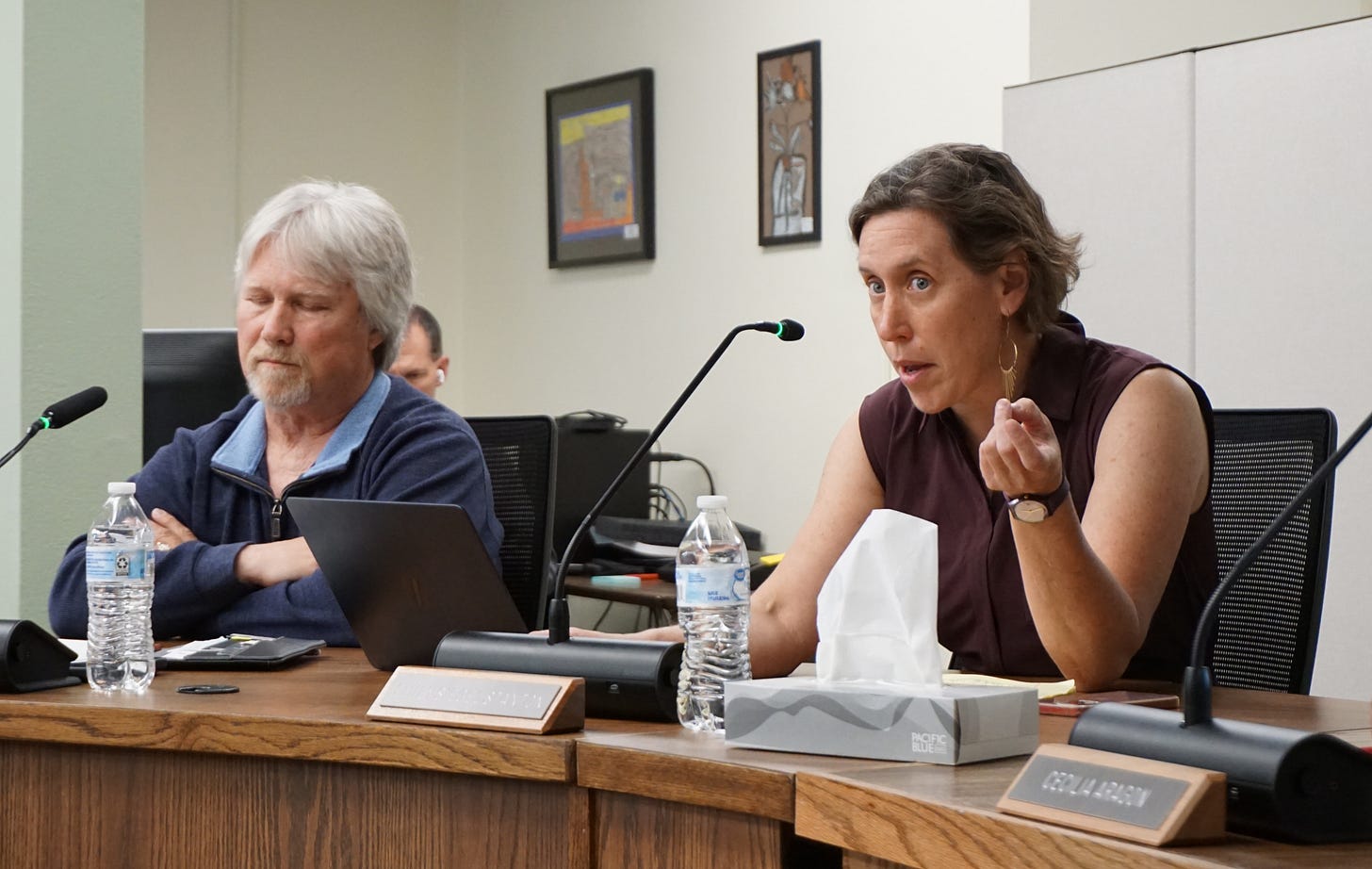
Last year also saw the passage of a forced outing bill that requires school districts — including teachers and counselors — to out gay or transgender youth to their families even if those families are not supportive.
Taken together, the slate of new legislation segregates transgender folks — especially young transgender folks — from their cisgender peers. Trans youth can now expect to be treated differently in bathrooms and locker rooms, during team tryouts, and when accessing healthcare or school counseling.
Facts and feelings: Appealing to a science that doesn’t exist
The lawmakers who pushed the sports ban — and the public commenters who supported it — often made appeals to a scientific consensus about trans participation in sports that does not exist.
They frequently claimed their positions were “rooted in evidence-based facts” rather than “feelings or identities.”
But the research investigating whether trans athletes retain a biological advantage post-transition is not so conclusive. It’s an active area of research with evidence pointing in many directions. It might be that advantages persist in some metrics while not in others, and that these realities impact certain sports more than others, while impacting some sports not at all. It may be that advantages fade over time.
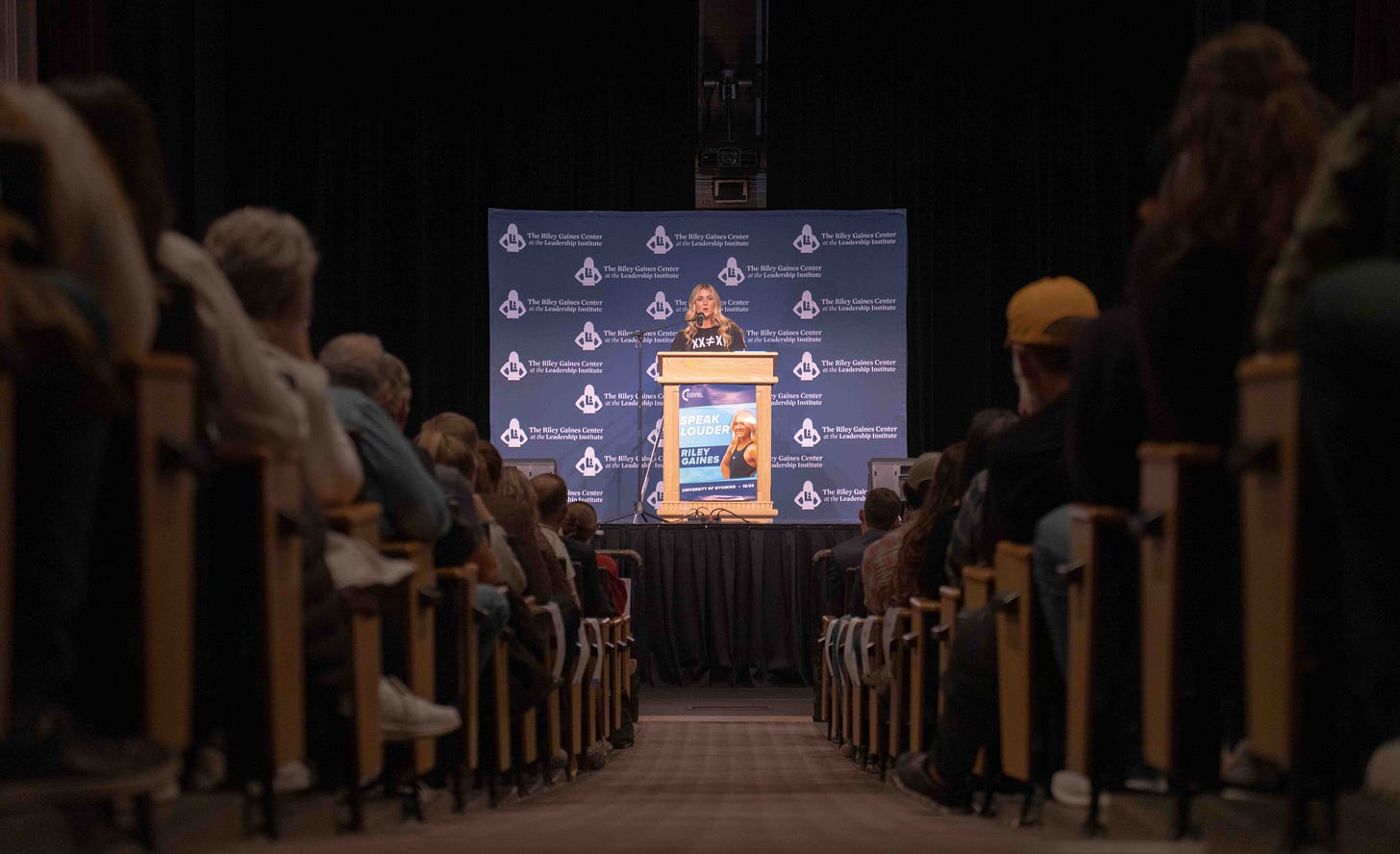
But inaccurate claims of a settled science carried the day, ushering in the sports ban the same way earlier misinformation or outright lies ushered in the ban on gender-affirming care.
The “grim” new reality for Wyoming’s transgender youth stands in marked contrast to Murillo’s own experience of growing up and going to school in a variety of Wyoming communities.
Reflecting on her time with the UW Spirit Squad, Murillo said the university “really supported” her.
“They wanted to make sure I was protected,” she said. “I had a very great transition experience — especially as somebody who was transitioning very publicly.”
That level of support is unthinkable today. UW forfeited two volleyball games last fall rather than play against a team featuring a transgender competitor — despite having played that team, and that specific athlete, previously. Starting July 1, when SF44 takes effect, UW will be legally forbidden to play any such team, let alone feature or support its own transgender athletes.
The high schools that feed young athletes into UW are forbidden from the same, meaning any aspiring trans athlete will either have to abandon their plans or abandon the state.
Coach Murillo, however, isn’t going anywhere.
“I’m staying in Wyoming,” she said. “I’ll continue to fight this fight. But this is my home. This is where I’ve built my life.”
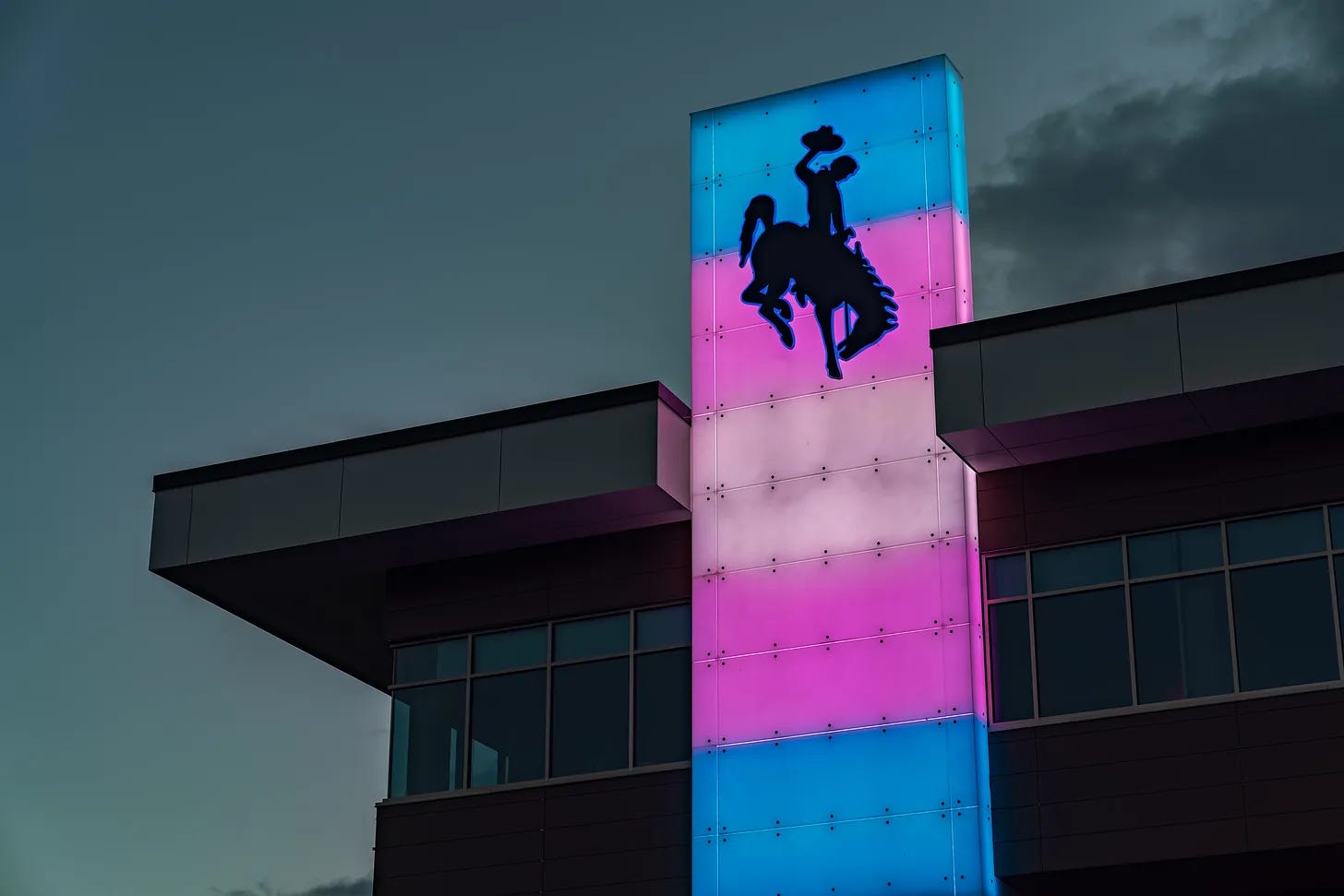
2: Conviction and passionate intensity
It’s still freshman year. It’s too cold to camp so you’re getting on with high school as best you can.
You’ve been to the doctor. You’d like hormone blockers because you don’t like what’s in store for your body anymore than the volleyball coach who rejected you.
You know, because you’ve done your research, that hormone blockers are safe and often beneficial. You know if you change your mind, you can stop taking them and continue on with the horrors of puberty.
You’re pretty sure you won’t change your mind, but it’s nice to have more time to consider. You’re also pretty sure you’ll want the estrogen that should have been your birthright as soon as the doctor recommends it.
Your parents, who thankfully love and accept you, want this for you. Hell, the doctor wants this for you. It’s a safe intervention. It’s the recommended healthcare for someone like you, who is both consistent and persistent about their gender identity.
But your doctor’s hands are tied by the government in Cheyenne. If he treats you in the best way he knows how, if he gives you the highest standard of care he knows how to give, they will strip him of his license. He will never be able to help another child again. And he can’t take that risk.
He follows the law. For the time being, you go without medicine.
You remember running around the playground swinging a yellow lightsaber, mimicking Daisy Ridley’s accent. Now you’re growing stubble.
Your parents, radicalized by their love for you, take you to Colorado to access the care you need. It’s a trek, and wildly inconvenient, but at least now you’re on blockers and eventually you’ll go on hormones.
By the time you enroll at the University of Wyoming, there’s no chance of you going out for volleyball. You simply wouldn’t be good enough after missing the four years of training and competition that’s still legal for cis girls. But even if you were good enough, this door is closed to you as well.
UW does not accept, and will no longer fight for, transgender athletes.
But honestly, at this point, that’s not your main concern. There are other more immediate government intrusions into your life.
You still use the women’s restroom, as you always have, and most people don’t take any notice. After all, you look every bit the young woman you are. But occasionally, a busybody clocks you, deciding you don’t look woman enough, and you start to fear being reported every time you go to piss.
That busybody, meanwhile, can sue UW if they see you in a restroom and feel “aggrieved” enough to pursue civil action. UW, to avoid such a suit, must sufficiently discriminate against you and all other gender non-conforming folks. Otherwise, in the language of the law, it will have “failed to take reasonable steps” to box you out.
Maybe you start a “dehydration plan” — as some Wyomingites already do — limiting your fluid intake, holding your pee until you get home. Maybe you spend less time out and about, where your cisgender friends wander freely, avoiding the student union or the library or any coffee shop that doesn’t have an individual bathroom.
And you start to question more seriously your future here, in this beautiful state you grew up in. You can love this place with all your heart. But if it doesn’t love you back, maybe it’s not so healthy to stay.
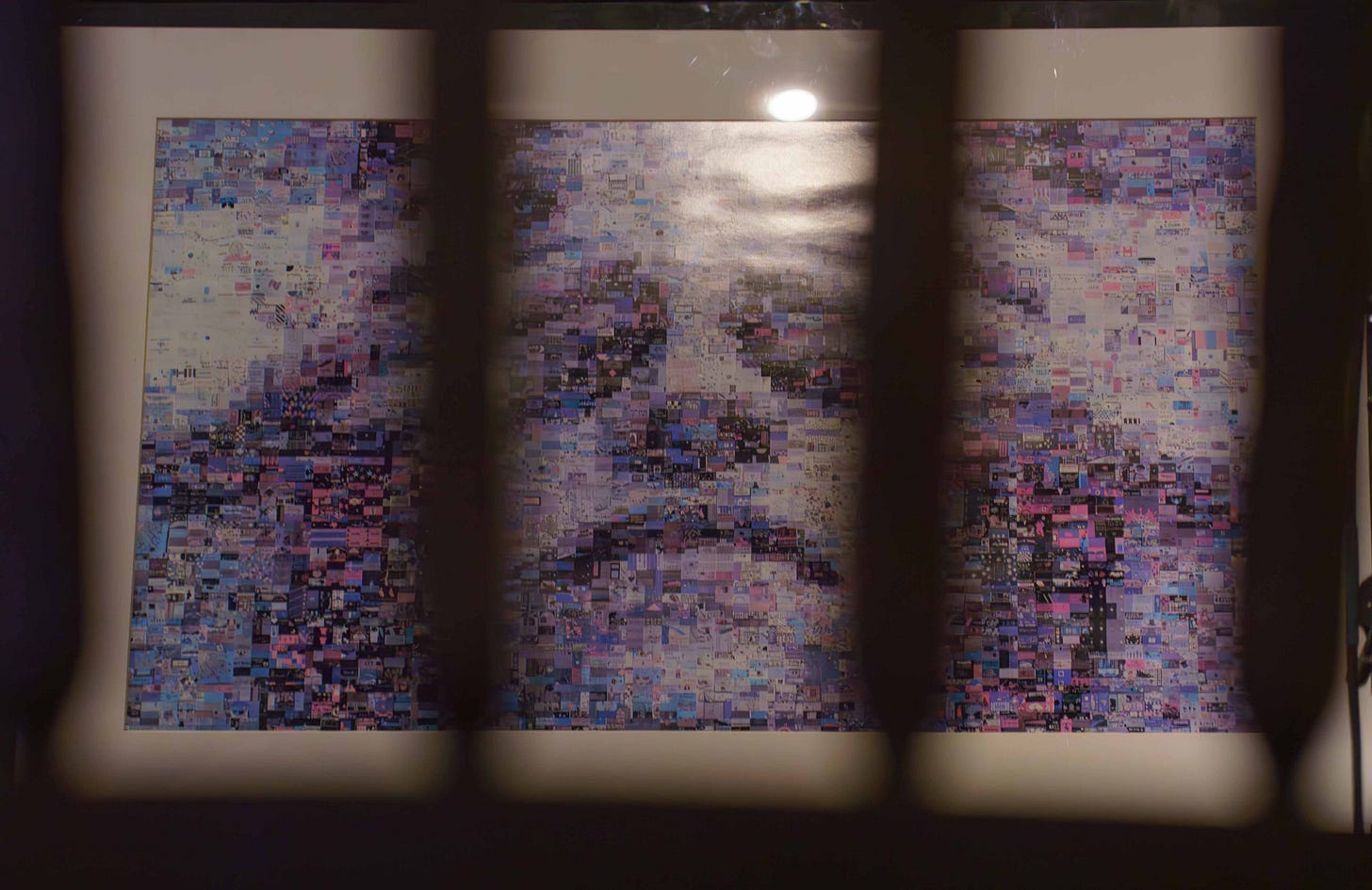
Everyday acceptance and the ‘fear mongering’ disrupting it
Wyoming bleeds young people.
Whether pulled away by careers or pushed away by culture, the “brain drain” contributes to an ancient problem for Wyoming. Simply put: most people don’t want to live here.
If trans people flee, the Equality State could lose more than graduating high school and university students. It could lose people like Alex Edwards, an X-ray technologist in Lander who’s passionate about helping people.
“I don’t know if I believe in ‘meant to be,’ but I was meant to be in healthcare,” he said. “I love it. And it genuinely fills me with so much hope, even on the days when it makes me livid.”
Hailing from Rock Springs, Edwards’ family moved out of state to the deep south when he was a teen. He stayed there for college, and joined Georgia State University’s Alliance for Sexual and Gender Diversity. The alliance is where he met his spouse; it’s also where he started to feel safe identifying more accurately.
“They were the first people to say stuff to me like, ‘Being trans isn’t about looking a specific way. It’s about who you are. You do not have to meet any specific standards,’” Edwards recalled. “And that blew my freaking mind.”
In the years that followed, Edwards found his way back to Wyoming, into healthcare, and into hormones. Now an X-ray tech at Sagewest Hospital, Edwards said he’s been accepted by his colleagues, even throughout the transition.
“I have lived and worked in multiple Wyoming towns, and I am a very visible transgender person, and I would say that I get next to no honest-to-goodness hate,” he said. “I get lots of ignorance. I will not pretend like I don’t. A lot of people putting their feet in their mouth? Absolutely.”
But hatred is rare.
Edwards said it’s hard to square the casual, everyday acceptance he receives from the people of Wyoming with the activity of the lawmakers those same people send to Cheyenne.
“They really do care for us as people — they’re just being told, ‘You have to vote this way,’” Edwards said. “But all of these people who are like, ‘Yeah, I think this is a reasonable bill,’ they don’t actually hate us. They’re being taught to hate us, and it’s working, and it pisses me off.”
‘Creepy lies’: Misinformation underpins the agenda once again
Edwards said lawmakers are leaning into “creepy lies” about transgender folks being a threat, or about cisgender male rapists dressing up as women to assault victims in women’s bathrooms.
When Casper Rep. Jayme Lien (HD-38) defended her bill, the What is a Woman Act, before the House Labor Committee, she made this exact argument.
“If you have the ability, under the guise of this community, to enter a restroom as a trans individual, that puts a lot of people at risk,” she said.

Once again, the scenarios being used to push anti-trans policies in Wyoming are hypothetical or anecdotal while claims of their prevalence are not well-sourced.
There’s no evidence that allowing transgender women to access female spaces has or would increase the use of such a criminal tactic.
The available research points in the opposite direction. Indeed, places that have allowed trans women into female bathrooms don’t report any uptick in this kind of crime. According to the best available evidence, trans-inclusive policies do not harm bathroom safety, probably because, as both law enforcement leaders and journalists have argued, a motivated criminal is unlikely to be deterred by a transgender bathroom ban.
But that doesn’t mean such bans are neutral.
The flipside: Trans-inclusive policies make bathrooms safer
Trans women argue they’ll be safer in the women’s than they would be in the men’s, and they have significantly more evidence for their claims than Lien or other state lawmakers have for their own.
Transgender and nonbinary individuals are far more likely to experience violence than cisgender people in general, and there’s evidence that trans and nonbinary youth are more likely to be the victims of sexual assault when their bathroom access is restricted.
So trans-inclusive bathroom policies make bathrooms safer because they shield an embattled minority from some of the harassment they would otherwise experience.
But Wyoming lawmakers passed two bills this year restricting access to bathrooms and other public spaces, and another enabling such cisgender-transgender segregations in institutions across Wyoming.
For Edwards, the new legislation represents a stinging lack of trust in transgender people.
“I am entrusted with the legal right to give someone CPR, to help someone survive; I can give legal radiation.” Edwards said. “I am entrusted with all these things … You’re going to trust me to save your damn life, but you’re not gonna trust me to urinate?”
Edwards said the relationship between the state and its trans residents, as mediated by the new legislation, is beginning to feel extractive.
“You want to take what we give you, want to take all of our labor and all of our time and all of the great things that queer and trans people do — and you just want to throw it in the garbage because we’re not human to you,” he said. “You don’t want us to exist outside. You want us doing your labor and not existing next to you.”
Despite his frustration, Edwards hasn’t lost his fundamental belief in, or his love for, people. He said folks tend to believe in anecdotes, however inaccurate, because for many, the assailant from a lawmaker’s hypothetical is the closest they’ve come to knowing a transgender person.
“I hate this classic fear mongering,” Edwards said. “I hate the fact that all of these straw men are being produced, and somehow I’m not allowed to pee. It’s just exhausting.”
3: Slouching toward Bethlehem
You take refuge in the wilderness. Your weekends are spent hiking Vedauwoo and Medicine Bow.
You love the forest. You love these wide open spaces. You love this high and dry desert, its unique formations weathered by twenty centuries of stony sleep and a great deal more. There’s a freedom inherent in such sparsely populated nature.
You breathe it in. And you wonder if you’ll have to give it all up.
This state hates you. You’ve been a woman for years now, and the people in your life accept you. You’ve long since cut out anyone who doesn’t.
More than that, you’ve found your people. An extended web of queer young folks, a constellation of support and romance and protest that make a community what it is. A found family, hardened in the same western soil that grew you.
But you can’t choose your neighbors as easily. Nor your co-workers. Nor the leaders in your field who decide whether you’ll advance.
It’s a dead end here for a trans woman like you — this place that denies you access to convenient, safe bathrooms, this place that segregated you from your cisgender girlfriends in high school and again in college, this place that denied you easy access to the medicine that saved your life.
And now they’re talking about outlawing that medicine for adults.
“I should go,” you say to the weathered granite and the evergreens. “This place wants me dead.”
Several of your friends have already had these thoughts. You know this because several of them have already left.
At 23, you’re becoming an “elder.” It sounds like a sick commentary on your life expectancy, but you know it’s actually the flipside of a hard truth: Things fall apart.
The coffeeshops have cleared out. The bars even more so. Your people are cast to the wind, making lives in places where they can piss in peace. No one stays.
But this is your place, too, you remember. Why should you have to give it up? Maybe you should stay and keep fighting. But also maybe you shouldn’t have to. You’re angry at anyone who’s made either choice because they both feel wrong. But you love everyone who’s made either choice, too, because you know they’re both right.
You take in the vista and a quiet voice wonders: Would you even be happier elsewhere? Or would the darkness follow?
The rocks and the trees don’t say a word. They’re good company all the same.
Connection, visibility and other strategies for survival
Elliott Hinkle, like Edwards, returned to their home state looking to serve it. For Hinkle, unlike Edwards, that love of Wyoming was hard-earned.
The nonbinary Casper resident said they fled the state for college, bearing the painful memory of the conversion therapy inflicted on them.
“Obviously, it wasn’t successful,” they said. “I’m very gay now — but they tried.”
The humor masks a darker reality all too familiar to transgender youth. Hinkle said they knew, if they didn’t leave Wyoming, “I’d probably take my own life.”
At Portland State University, they “spitefully” earned a degree in gender and women’s studies.
“Probably a couple years into being in Portland, I had enough safety and access to resources to process and transition,” Hinkle said. “And so I transitioned from female to male, but really more so female to non-binary.”
They eventually founded Unicorn Solutions, a consulting firm specializing in youth and LGBTQ+ mental health.
In 2024, ten years after leaving, they returned to the Equality State.
“As much as the rhetoric and the news can sound bad, there’s still just really amazing people here that do care a lot about queer and trans folks,” Hinkle said. “They care about their kids. They want a space where the mindset of ‘live and let live’ continues on … I would rather be helping families and supporting their kids than sitting in Portland feeling like I’m doing nothing.”
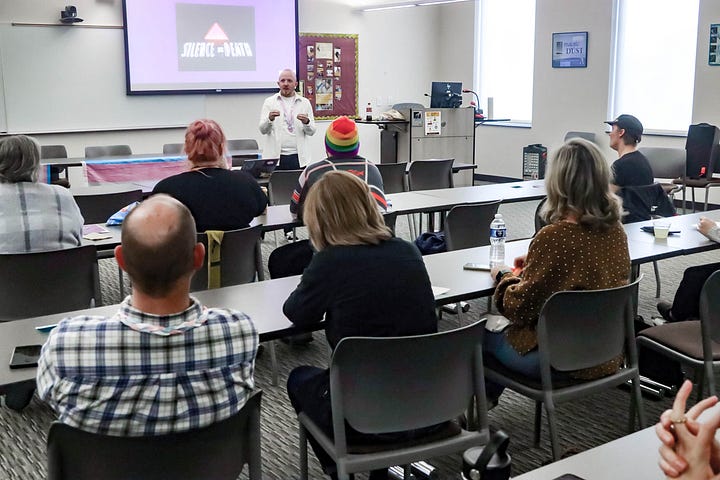
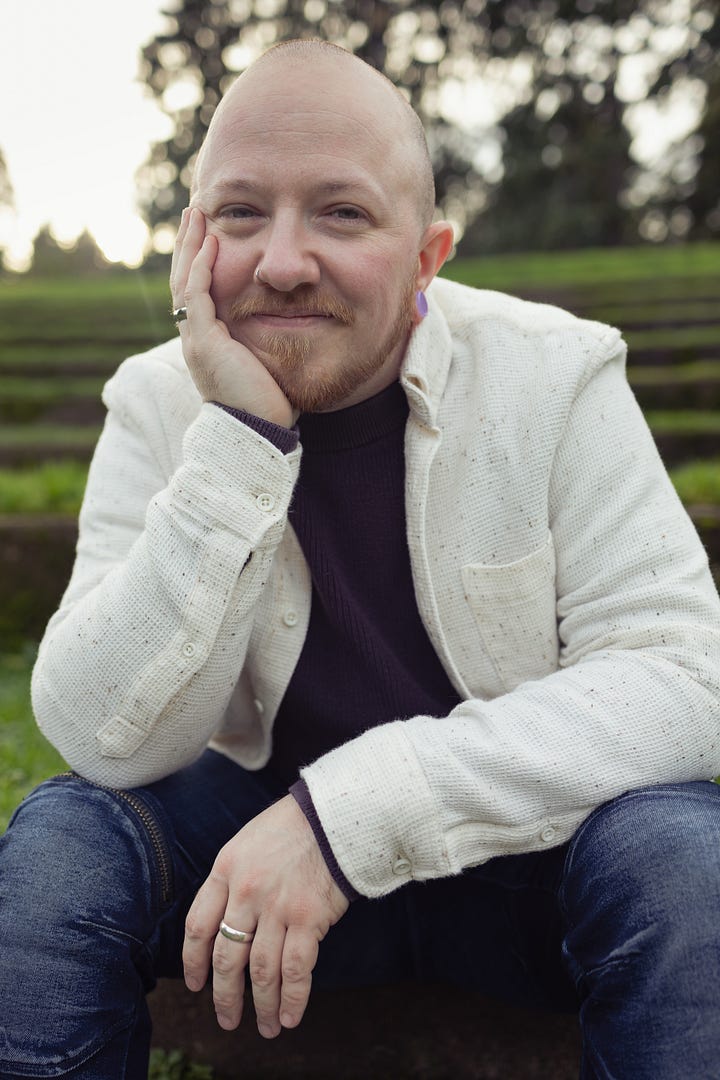
This year, Hinkle started making their voice heard in legislative committee hearings, testifying against both a bathroom bill (SF62) and the What is a Woman Act (HB32).
Despite the wave of legislation limiting where they can go to the bathroom and endangering the safety of the youth they serve, Hinkle said this state is where they want to be.
“My hope is to stay at least for a while,” Hinkle said. “I came here wanting to have an impact, and part of that impact is making sure that queer and trans folks feel supported, but also that the people who work with them have the access to information and resources that they need.”
There are factors that could change Hinkle’s mind. For one, they said, if they were no longer able to get testosterone, that might damage their mental health enough that it would be safer to leave.
But until and unless that happens, Hinkle said they’re going to push back on the clear “get out” message their state government is sending.
“I don’t really have an interest in giving power to people when they’re trying to take it from me,” Hinkle said.
‘This is my home’: Surviving the blood-dimmed tide
Others feel differently. For some trans folks, the writing is on the wall and if it’s possible to leave, they plan to. One transgender resident of Cody — who asked to remain anonymous for fear of retaliation — said they want to leave but can’t afford it right now.
“I just am, for the most part, trying to keep my head down so that I don’t eventually become part of the witch hunt,” they said. “And that's a very selfish thing to say, but it’s all I can do right now. It’s all that I know.”
Those who do plan to stay — including Hinkle, Edwards and Murillo — have some advice for surviving the coming years.
They each stress that the fight is not over.
“We need young people to vote,” Murillo said. “We’re not going to shift the hearts and minds of the Freedom Caucus. The only thing we can do is vote them out.”
Beyond voting, Murillo said trans Wyomingites need to be more visible in the halls of power.
“It’s easy to be cruel to people you don’t know,” she said. “It’s easy to vilify people you don’t know. And I think that’s the issue that we’re running into here. A lot of these legislators have never interacted with a trans person, and if they have, it’s been me.”
But Murillo’s been testifying for four years. She said the moderate, winnable lawmakers need to see more of the trans residents who live, learn and serve in their communities across the state.
Murillo said the capitol building in Cheyenne might seem like “a scary and intimidating place.”
“Not a lot of trans people show up in the capitol, because it’s a place that really isn’t made for us,” Murillo said. “I remember my first time ever going to the capitol, and I was terrified, but now it’s like second nature.”
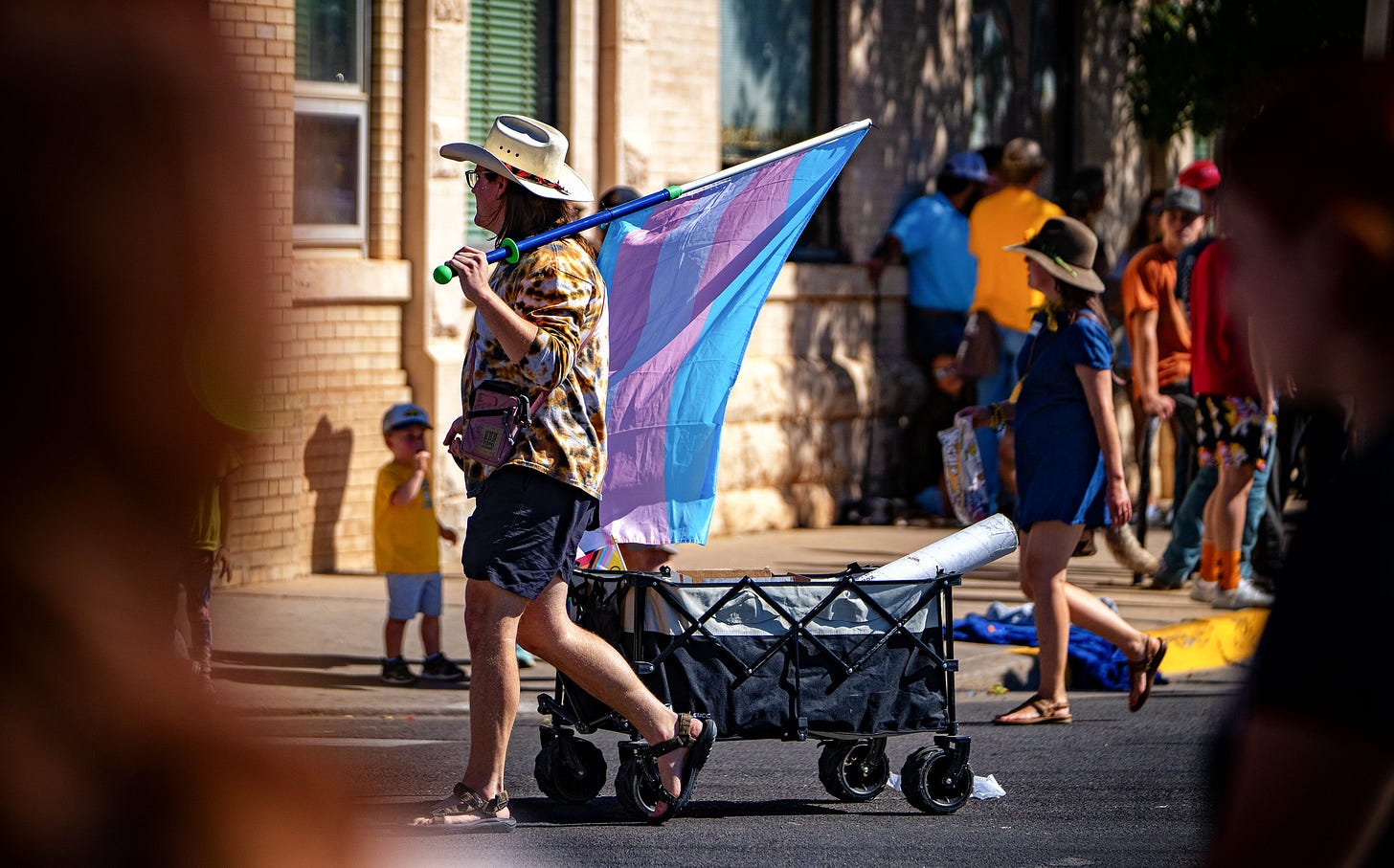
Hinkle agreed it’s important to “continue talking to legislators,” and to not see the struggle for transgender rights “as over and done with.” Conversation, especially uncomfortable conversation, will be necessary.
“For me, it’s really important that I don’t write off every single conservative Republican legislator,” Hinkle said.
Outside of the fight, and in addition to it, Hinkle said it’s important to realize there are more accepting folks in Wyoming than a survey of its leaders would suggest.
“Stay connected to community,” Hinkle said. “It has never been more important, especially for queer and trans people, but for anyone, to find your people and connect with them and make time to interact in person.”
They said anyone can support young people by letting them know “if they were to ever come out, that it’s safe with you.”
“Make sure that they know that you care about them regardless of who they are,” Hinkle said. “That messaging is starting to shrink away out of fear — and they’re hearing it.”
The new regime in Wyoming has made radical strides against what was, until recently, a dawning societal acceptance across America for the nation’s transgender citizens. From its locker rooms to its sports fields, from its doctor’s offices to its counselor’s reports, that new regime has rendered the Equality State one of the country’s least welcoming locales for transgender and nonbinary folks.
As these new laws remake Wyoming, they will drive away transgender workers, scholars, artists and more. But they will never entirely stop those workers, scholars, artists and more from existing.
“Trans people aren’t going anywhere,” Murillo said. “We’re always going to be in Wyoming. We always have been.”
And those who plan to stay won’t give up without a fight.
“This is my home,” said Edwards, the Wyoming-born X-ray tech who returned to build a life in these wide open spaces. “And they’re going to take it from my cold, dead hands. I don’t deserve to leave because other people are assholes. I deserve to be here.”




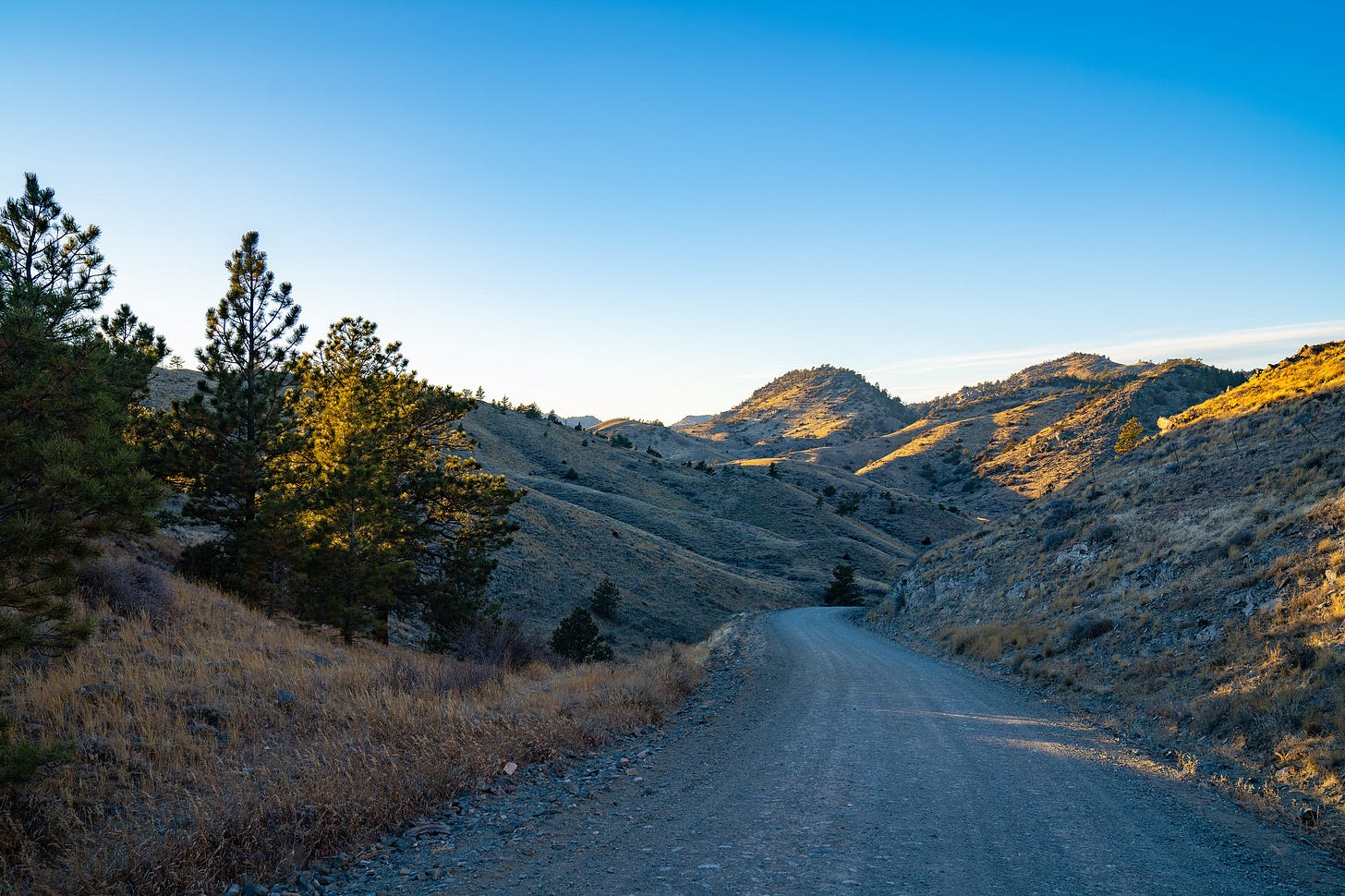
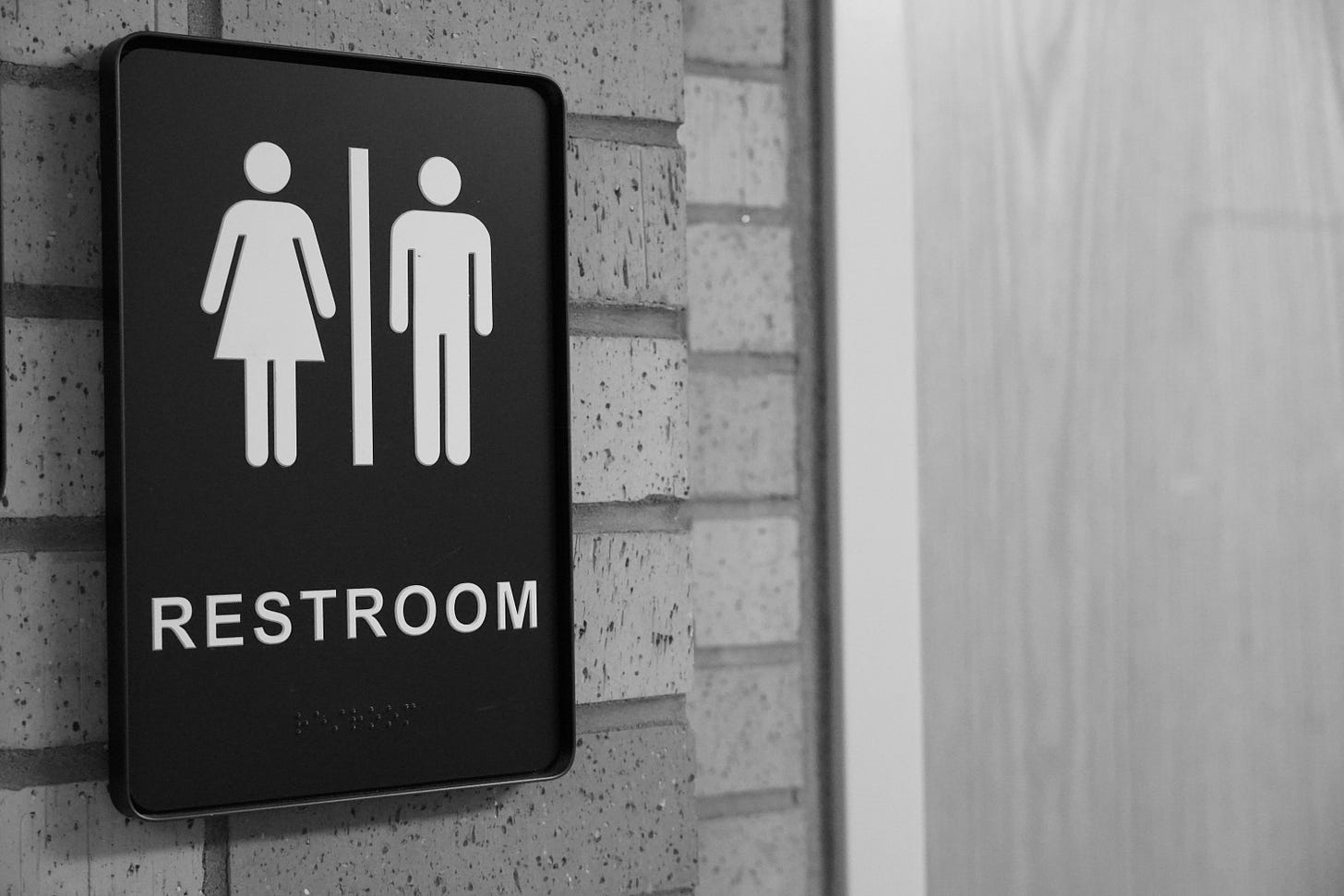
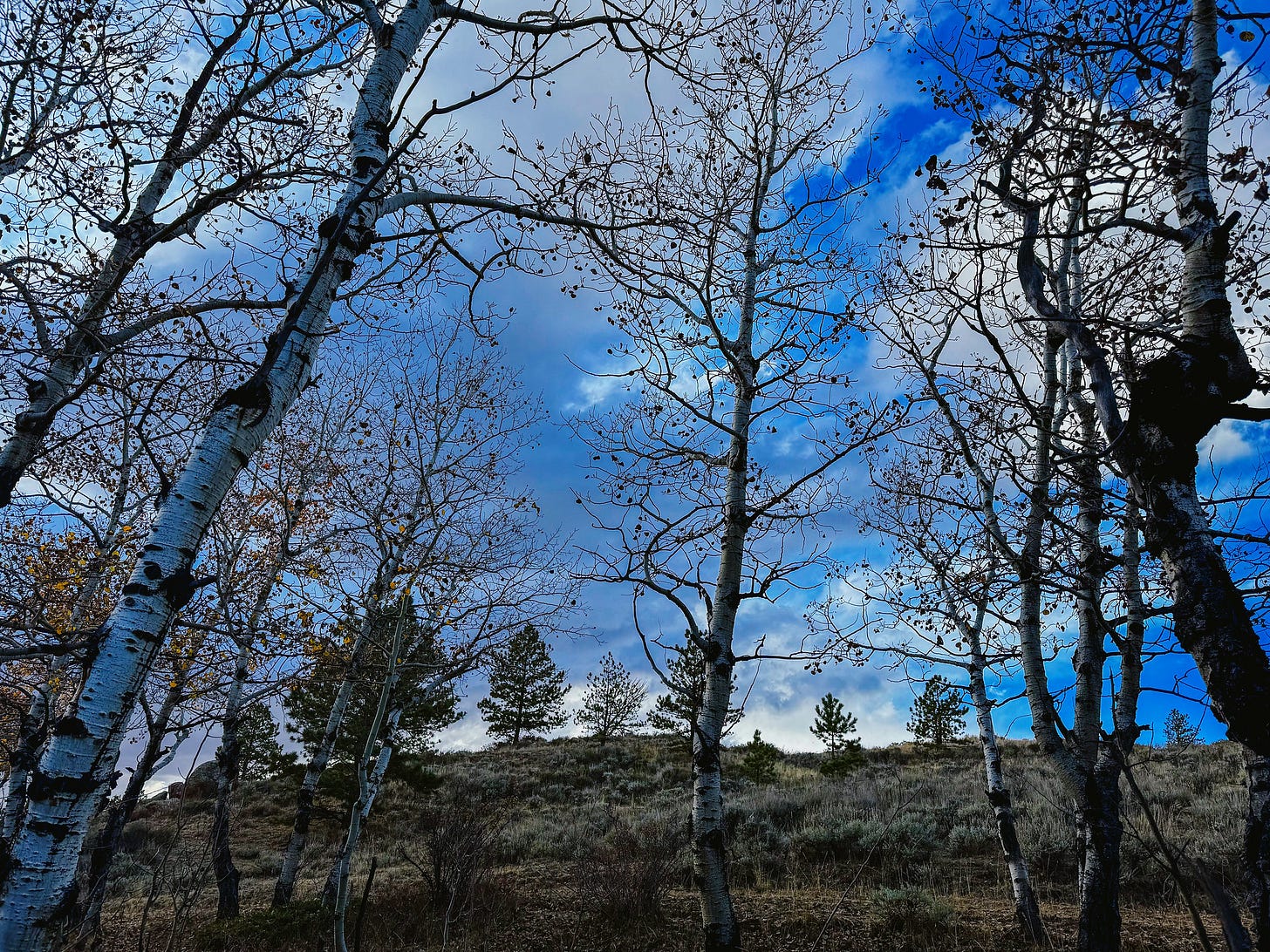
Tremendous piece, Jeff. Thank you.
Thank you for lovingly attending to this moment.